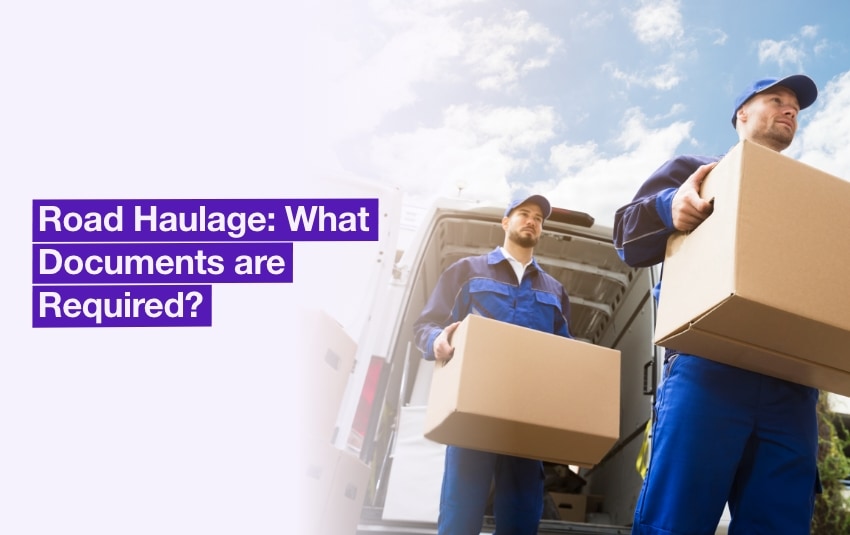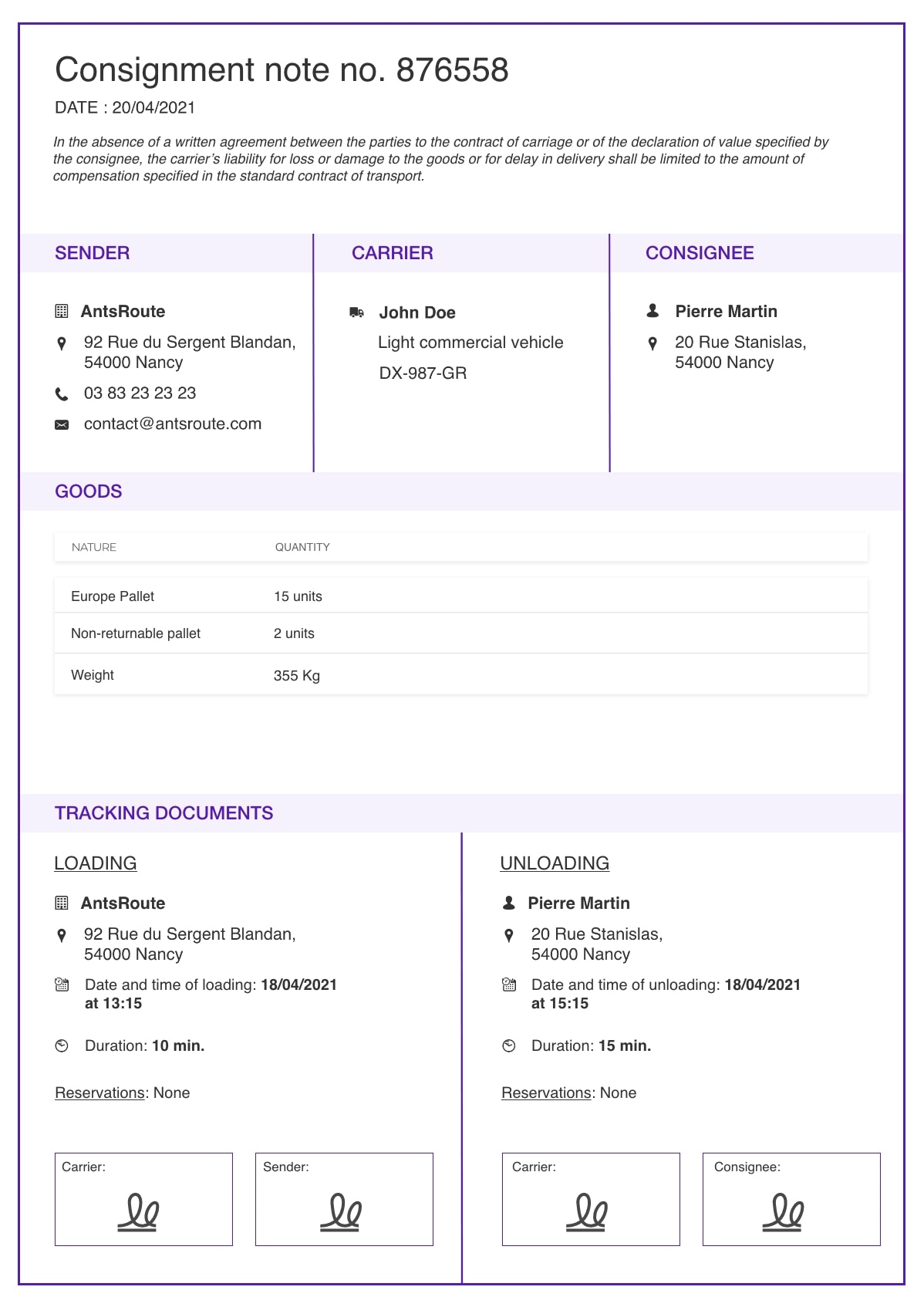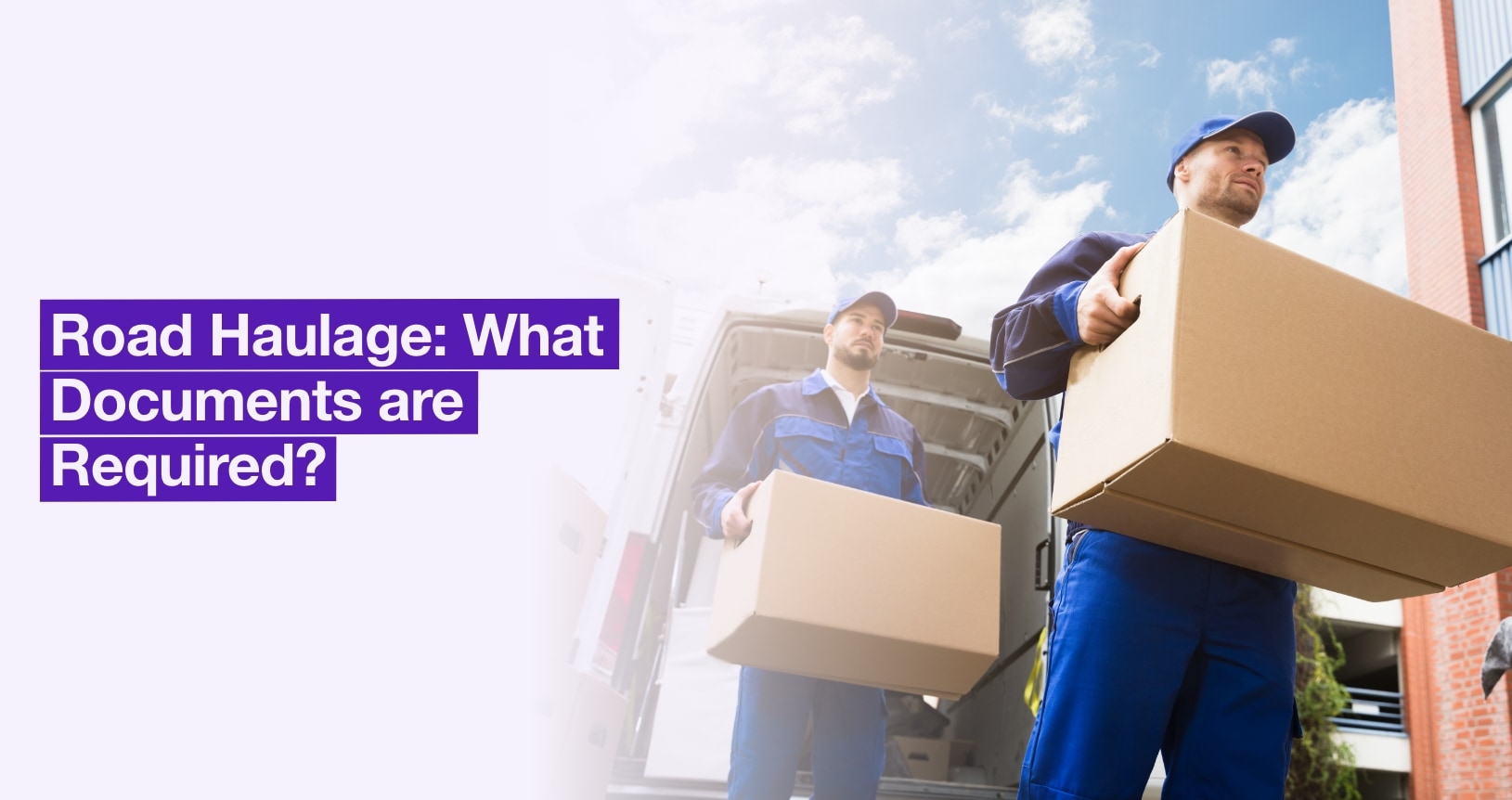Compulsory Documents for Road Haulage

The transport sector is more than just a business activity: it is the indispensable engine that connects businesses, industries, and consumers around the world. Organising a shipment of goods requires meticulous management of road haulage documents. Every detail counts: from the driver to the vehicle to the goods being transported. These documents are crucial, and the slightest omission can be costly to a company, both financially and legally. Find out which documents are essential for hassle-free road haulage.
Table of contents:
- Documents concerning the driver
- Documents relating to the transport vehicle
- Essential documents for your goods
- The particular cases
- Customs documents for international imports and exports
- Dematerialisation: an advantage for hauliers and drivers
Road haulage documents are essential on board the vehicle. For the transport company, they guarantee the conformity, legality and safety of shipments.
Documents Concerning the Driver
Ensuring a smooth and legal journey depends on strict compliance with UK government regulations. To ensure compliance during a roadside check, here are the essential documents that every driver must have on hand:
- Driver’s License: A valid UK driving license appropriate for the vehicle you’re driving.
- Certificate of Professional Competence (CPC): Proof of completed training and certification for professional drivers.
- Driver’s Digital Tachograph Card: Used for recording driving times, annual leave or sick leave.
- Driver’s Identification: Passport if you are travelling between countries, or UK national ID card.
- Driver Qualification Card (DQC): Issued upon completion of CPC training.
- ADR certificate: If transporting dangerous goods, where applicable.
Before handing over your precious cargo, make sure your driver has all these documents. These checks not only ensure compliance with legislation, but also guarantee the safety and efficiency of your transport operations.
Documents Relating to the Transport Vehicle
To ensure that your vehicle is ready for the road and that your goods are shipped without a hitch, here are the essential road haulage documents:
- Vehicle and trailer registration documents: The key documents for proving the identity and cover of your vehicle. For example, the vehicle log book (V5C), an official document issued by the Driver and Vehicle Licensing Agency (DVLA) in the United Kingdom, is used to register and record the details of a vehicle and its registered keeper.
- Insurance Documents: Comprehensive vehicle insurance details.
- Goods Vehicle Operator’s License: Required for operators of heavy goods vehicles (HGVs) over a certain weight (typically 3.5 tonnes or more) used for commercial purposes.
- International Motor Insurance Card (Green Card): Required for international travel within certain countries as proof of the insurance cover.
- UK stickers (previously known as GB sticker): The stickers must be displayed clearly on the rear of your truck to travel on European roads.
- Vehicle Excise Duty (Road Tax): Proof of payment of the Vehicle Excise Duty, commonly known as road tax. This is usually indicated by the vehicle tax disc (though now digital).
- Vehicle Inspection Records: Documentation of regular servicing and maintenance performed on the vehicle, including repairs and replacements. Essential for demonstrating that the vehicle is kept in good working condition.
Essential Documents for your Goods
Transporting goods in complete compliance and safety means ensuring that each product loaded is accompanied by the appropriate documents. The main documents required according to the UK government:
- Packing List: Details about the cargo shipped, such as dimensions, and weight of each package.
- Bill of Lading (BOL) / Consignment Note: Legal document issued by the carrier to a shipper, indicating the type, quantity, and destination of the goods being transported. It serves as a shipment receipt when the carrier delivers the goods at the agreed destination.
- Commercial Invoice: Lists all the products delivered, with their individual prices and the total, and serves as a reference in the event of a dispute.
- Certificate of Origin: It certifies the country where the goods were manufactured. This certificate is used for determining tariffs, duties, and compliance with trade agreements.
- Insurance Certificate: It provides proof of insurance coverage for the goods during transit. It is essential for risk management and claims in case of loss or damage.

An e-consignment note generated using AntsRoute software.
There Are Some Particular Cases
Transport of Dangerous Goods
The transport of dangerous goods is governed by the Agreement concerning the International Carriage of Dangerous Goods by Road (ADR). This European treaty requires a number of checks to be carried out before these products are delivered.
- Vehicle approval certificate: Authorisation to transport dangerous substances.
- Detailed safety sheet: Information on risks and safety measures.
- Consignment note with specific mentions: Type of goods and necessary precautions.
- Driver training certificate: Qualification to handle and transport dangerous goods.
- Identification document: Photographs of the transport team.
- Class of goods: It classifies the type of danger posed by the goods.
- Names and addresses of the consignor and recipient.
- Number of packages: Total number of packages transported.
- Quantity of dangerous goods: Details the quantity being transported.
- Packing group of the goods: Level of protection required.
Make sure you’re fully equipped for safe shipping! Information must be clear and precise to facilitate checks.
Exceptional Transport
The dimensions and weights of vehicles used in the UK are regulated by the Road Vehicles (Construction & Use) Regulations 1986 (C&U) Regs and the Road Vehicles (Authorised Weight) Regulations 1998 (AW) Regs.
The vehicles that do not comply with the C&U and AW Regs can be used under the authority of the Road Vehicles (Authorisation of Special Types) (General) Order 2003 (STGO).
For all exceptional transport, the driver must have the following documents:
- Special Types General Order (STGO): Authorizes the transport of abnormal loads within specific weight categories.
- Special Order Movement: The order authorisation for the vehicle movement, that is issued on behalf of the Secretary of State by National Highways, Birmingham office.
- Vehicle signage: It should be fixed in a vertical position to the front of the vehicle.
- Notification Documents: For movements involving exceptional loads, hauliers must notify the relevant police forces and highway authorities in advance.
- Vehicle Special Order (VSO): Required for vehicles that do not meet standard construction and use regulations, but need to be used for transporting abnormal loads.
- Escort Vehicle Documentation: Registration and insurance details for escort vehicles.
- Driver’s Qualification Certificates: Proof of driver’s training and qualification.
These documents vary according to the nature of the goods being transported and the specific conditions of the journey.
The Other Cases to Consider
Some goods, although not classified as dangerous, require specific precautions:
- Perishable goods: These must be transported at controlled temperatures, which requires a technical certificate of conformity to guarantee the cold chain and prevent deterioration of the products.
- Transport of live animals: Requires a type 1 or type 2 carrier authorisation.

A certificate is required to transport certain types of goods.
Customs Documents for International Imports and Exports
Certain customs documents are essential for smooth, compliant international trade:
- Transit permit (T1, T2, etc.): Allows the transfer of goods of third-party origin without a specific customs procedure.
- Single Administrative Document (SAD): Also known as Form C88, it controls and monitors the movement of goods subject to excise duty.
- EUR movement certificate: Certifies that goods come from the EU and are destined for third countries with preferential agreements.
- TIR Carnet (International Road Transports): Essential for international road transit operations, covering duties and taxes.
Dematerialisation: an Advantage for Hauliers and Drivers
Dematerialisation is revolutionising the transport sector by simplifying document management. Consignment notes, delivery notes and invoices can now be digitised and presented at roadside checks. And this is just the beginning! Thanks to European regulation 2020/1056, law enforcement agencies are obliged to accept transport documents in dematerialised format, expanding the possibilities.
To take full advantage of this progress, you can invest in tools that enable you to manage your digital documents efficiently. Our route optimisation software, AntsRoute, includes a dematerialised consignment note solution.
Find out today with a free 7-day trial! To sign up, just click here! If you have any questions, contact our support team using our contact form.
WRITTEN BY
Florine Martin
Florine has been a freelance web copywriter since 2021, writing for a variety of clients in a range of sectors. Since the beginning of 2024, she has been writing articles about logistics for our company, AntsRoute.
Free 7-day trial | No credit card required
Contenu
- Documents Concerning the Driver
- Documents Relating to the Transport Vehicle
- Essential Documents for your Goods
- There Are Some Particular Cases
- Transport of Dangerous Goods
- Exceptional Transport
- The Other Cases to Consider
- Customs Documents for International Imports and Exports
- Dematerialisation: an Advantage for Hauliers and Drivers







